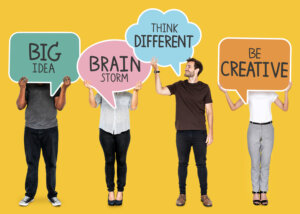I love how social media works to connect people across time and space. I’ve posted several of my blogs and articles on my Facebook page ( www.facebook.com/LindaJFerguson) and LinkedIn groups. From one of my posts, I ‘met’ Margot Borden from France. After a few exchanges of ideas, I invited her to write a guest blog post for us.
Margot has written a book that I look forward to reading- “Spirituality and Business: Exploring Possibilities for a New Management Paradigm” (Springer, 2010). Here are some thoughts she shares with us inspired by the work of Sri Aurobindo and Integral Psychology.
Enjoy!
Linda J. Ferguson
********
What blocks people from being more spiritual at work?
When addressing this question, it is useful first define what we mean by spiritual. Spirituality is essentially the relationship we have with our inner self or soul and the divine, love or the universal life force. The words each of us chooses to describe these will depend on factors such as our upbringing or our personal preference. Spirituality is non-denominational or trans-religious. It does not belong to, nor is it confined within, any religion but rather it transcends religion.
Sri Aurobindo, a great saint and philosopher of India says that, “Spirituality is nothing other than practical psychology.” This means developing the capacity to listen inward to our subtle senses and to learn to distinguish between the many inner and outer voices that pull us upward, downward and in any which direction and to start to develop the capacity to distinguish, follow and ultimately align to the voice of the inner self.
What’s the difference between spirituality and ethics?
Ethics can spring forth from within us when we are in touch with ourselves, or in soul-consciousness or it can be an external framework which we adhere to, such as in legal systems and religious laws. In other words, developing our spiritual awareness will change our perception or the intentionality behind our ethics. Our motivation to do the right thing will not avoid punishment adhering to any external set of rules, but rather it will stem from what we feel most deeply inside.
Like Sri Aurobindo’s definition of spirituality, above, following our inner ethical sense requires the same kind of discernment and capacity to choose the voice that resonates as true for us.
So, how do we build a relationship to our spirituality?
Sounds easy, right? Spirituality is simply a case of being in touch and living in line with our inner self. Well, it’s not quite that easy. There are many complexities and barriers between us and our spiritual essence. Fear is one of the biggest obstacles we will encounter. There is a kind of continuum between fear related to ego-based consciousness and oneness, harmony and being values which speak to us of soul-consciousness. While each of us has triggers that snap us into ego consciousness, we also have things that inspire us toward soul consciousness.
We can delve inside and discover how this dynamic works and aspire toward mastery–which essentially means always having the power and choosing to be in soul-consciousness, but since, let’s face it, that’s a very lofty aspiration, it can also be helpful to look at the environment around us, and try to co-create an environment that is conducive to a more soul-centered consciousness at work.
The bottom line is that fear (and the many voices and drives stemming from fear), along with lack of awareness or ignorance of our spiritual nature and potential are the major factors stopping us from being more spiritual at work.
Spirituality can effectively be brought into the workplace in implicit ways, through osmosis and, where there is receptivity, it can be done in more explicit ways such as coaching, seminars and retreats.
Spirituality—or the paradigm shift from ego to soul consciousness—at work will not only infuse our ethics with a higher resonance but our spiritually inspired minds and hearts have the potential to transform the way we do business at all levels of an organization, from process, strategy and inter-personal relationships all the way to mission and vision.
An organization that functions from a spiritual worldview will benefit from creating genuine value-added for their clients, employees, stakeholders, society and ecology in the form of congruence, meaning-making, fulfillment, and much more.
*******
Margot Borden is founder and consultant at Integral Perspectives. Margot does East-West Executive Coaching, Corporate Consulting and Psychotherapy. She works between Europe, USA and India. Her company is based in Paris. www.margotborden.com and www.margotbordenpsychotherapy.com.
Margot discovered yoga and Indian philosophy in her childhood and meditation a few years later. They form the foundation of her life and all of her professional activities. She completed her BA in International Business (American University of Paris) and her Masters in Humanistic Psychology (Durham, UK). In the west and India, she gives public lectures and workshops in companies, business schools and to the general public on her approach to psychology as well as on the topic of her book, “Spirituality and Business: Exploring Possibilities for a New Management Paradigm” (Springer, 2010).
 Sections of this topic
Sections of this topic
















